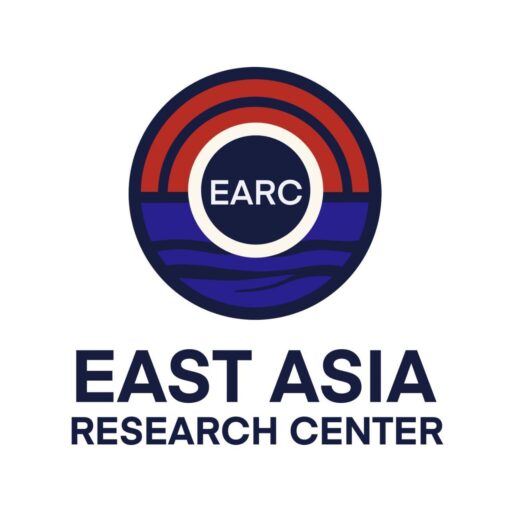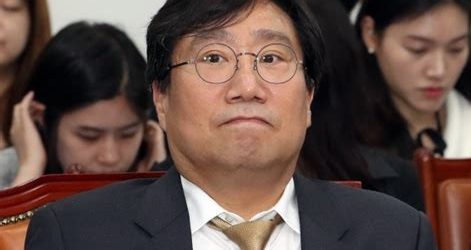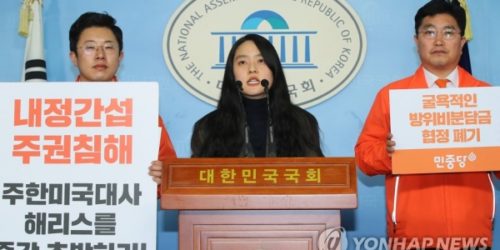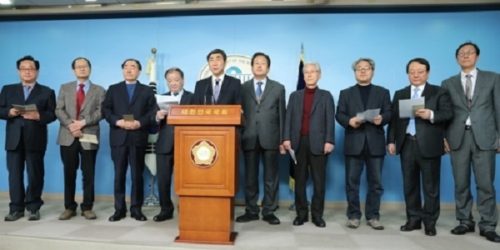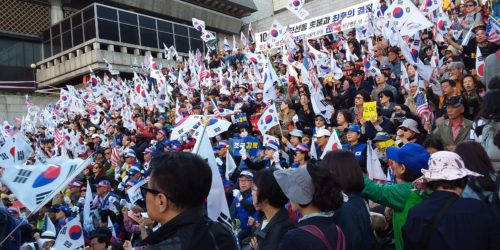68.3% of South Korean Citizens Say the Number of Lawmakers Should be Reduced…72.3% of the Citizens Oppose Interlocking Proportional Representation…May Poll Result by Opinion Research Justice
2019-5-10, PennMike
- President Moon handles state affairs “badly” 46.8%, “well” 33.2%, “normal” 18.3%
- 72% “oppose the Adoption of the Interlocking Proportional Representation System that increases proportional representatives” [truncated]
Question 1: The number of current national assembly representatives is 300. Do you think the number should be reduced or increased?
- Reduced: 68.3%
- Increased: 13.6%
- About right: 14.0%
- Don’t know: 4.1%
Question 2: There’s a controversy over the issue of the interlocking proportional representatives system. If implemented, the number of proportional representatives could increase. What do you think about this issue?
- Oppose adopting the interlocking proportional representatives system that increases the number of the proportional representatives: 62.3%
- Should be implemented, even if the number increases: 27.2%
- Don’t know: 10.5%
Question 3: Creation of Gongsoocheo (an independent investigative body targeting senior officials) is controversial [see here for details]. The president is the one who has the authority to appoint personnel to Gongsoocheo. Do you think the Gongsoocheo could act independently of the president, who has the appointing authority?
- Difficult to act independently: 58%
- Possible to act independently: 37.4%
- Don’t know: 6.8%
Note: The “possible to act independently” was chosen at a higher rate by the respondents in Gwangju City/North Jeolla Province/South Jeolla Province (51%) and Daejon City/North Chooncheong Province/South Choongcheong Province/Sejong City (46%) compared to other regions.
Question 4: At the Blue House, there’s a special inspector’s office that inspects illegal acts by the president’s relatives and senior officials. However, the Moon Jae-in administration has not appointed the Special Inspector since he has taken office 2 years ago. What do you think about the delay in appointing the Special Inspector?
- Must be appointed immediately: 58%
- No need to appoint, since the position is unnecessary: 29.2%
- Don’t know: 12.8%
Question 5: Recently, the Prosecutor General Moon Moo-il (문무일) expressed his opposition to the ruling party-led creation of Gongsoocheo and the modification of the investigative authority between the prosecutor and the police. What do you think about this? [Moon Moo-il criticized the moves by stating they are counter to democracy.]
- It’s a convincing statement: 48.8%
- It’s inappropriate: 36.3%
- Don’t know: 14.9%
Question 10: Currently, one person can leave multiple comments [from multiple accounts] on the Blue House online petition site, so the issue of fabrication [of false impression for or against] is raised. What do you think about the possibility of fabrication?
- High possibility: 56.3%
- Low possibility: 33%
- Don’t know: 10.6%
Question 6: Do you think North Korea’s missile test on May 4, 2019 threatens or does not threaten the national security of the Republic of Korea?
- Threatening: 55.3%
- Not threatening: 41.9%
- Don’t know: 2.8%
Among the respondents in their 40s, “not threatening” (54.3%) was higher than “threatening” (44.9%). Among those from Gwangju City/North Jeolla Province/South Jeolla Province, “not threatening” (57.3%) was higher than “threatening” (41.4%).
Question 7: 6 South Korean citizens have been detained in North Korea for years and we do not even know whether the South Korean citizen kidnapped in Libya last year is alive or not. What do you think about the government’s efforts to free the citizens of the Republic of Korea?
- Not enough: 59.3%
- Enough: 21.7%
- Don’t know: 19%
Question 8: The Ministry of Patriots and Veterans is pursuing changes to selecting the National Independence Meritorious Persons. What do you think about conferring the status of National Independence Meritorious Persons to those who conducted independence activities prior to Korea’s independence [from Japan], but after independence, contributed to the establishment of the North Korean government, and even held senior positions in North Korea?
- Inappropriate: 59.3%
- Appropriate: 28.4%
- Don’t know: 12.3%
Question 9: The National Intelligence Service (NIS), the police, and Defense Security Support Command [established after dismantling the Defense Security Command] had been providing financial support to defector organizations that have contributed to providing information about North Korea, but the financial support stopped once the Moon administration began. What do you think about this?
- Not good: 43.9%
- Good: 38.9%
- Don’t know: 17.3%
“Good” was higher than “not good” among the respondents in their 30s and 40s. Geographically, “Good” received higher responses than “not good” among the respondents from Incheon City/Gyeonggi Province and Gwangju City/North Jeolla Province/South Jeolla Province.
Question 11: How do you assess President Moon’s handling of the state affairs?
- Doing badly: 46.8%
- Doing well: 33.2%
- Ordinary: 18.3%
- Don’t know: 1.7%
Respondents in their 50s (50.5%) and 60s (53.9%) showed higher than average for “doing badly.” By contrast, respondents in their 30s (37.5%) and 40s (43.5%) showed higher than average for “doing well.” Geographically, negative assessment outpaced positive assessment in all areas, except Gwangju City/North Jeolla Province/South Jeolla Province.
Daegu City/North Gyeongsang Province (62.3%), Busan City/Ulsan City/South Gyeongsang Province (58.5%), and Gangwon Province/Jeju Province (48.7%) especially had higher negative assessment than average (46.8%). By contrast, Gyeonggi Province/Incheon City (36.1%), Daejeon City/South Choongcheong Province/North Choongcheon Province/Sejong City (34.5%), Gwangju City/South Jeolla Province/North Jeolla Province (54.7%), and Gangwon Province/Jeju Province (39.5%) showed higher than average (33.2%) positive assessment.
The support rate for President Moon’s handling of state affairs reached a “deadcross phenomenon” in late October 2018, when the negative assessment (40.6%) was ahead of the positive assessment for the first time, and the trend has continued.
According to a poll commissioned by PennMike, the Opinion Research Justice (여론조사공정) conducted the poll by calling 26,609 men and women aged 19 and over nationwide on May 8 (Wednesday), 2019. 1,009 respondents completed the response and the response rate was 3.8% . The survey method was through cellular (65.4%) and landline (34.6%) phone calls with automatic response mixed method, and parallel random generation of phone calls using random sampling and random phone calls.
We applied sex, age, and regional weighting (rim weighting) based on the resident population statistics of the Ministry of Public Administration and Security at the end of April 2019. The sampling error is ± 3.1% at 95% confidence level.
[Note: This is one of the few articles on public opinion polls that actually list questions and describe the polling methodology.]
Source: https://www.pennmike.com/news/articleView.html?idxno=18837
